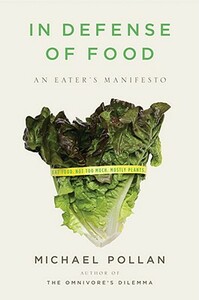You need to sign in or sign up before continuing.
Take a photo of a barcode or cover
Absolutely brilliant, I am going to read it again, and highly suggest it to others. He is so articulate and echoes many of my thoughts, as well as highlighting points about nutritionism and our food culture I hadn't thought of. Do read this one!
This book discusses the health behind the foods we eat. It is an excellent counterpart to [b:The Omnivore's Dilemma: A Natural History of Four Meals|3109|The Omnivore's Dilemma A Natural History of Four Meals|Michael Pollan|https://images.gr-assets.com/books/1393804353s/3109.jpg|3287769], which discusses the morality and ethics behind the foods we eat. For those that are worried that these books are trying to convert you to vegetarianism, they are not. I am not vegetarian (neither is the author, unless I’m mistaken). They merely encourage consumers to be more knowledgeable about what they eat and why. I highly recommend both of these books to anyone who eats food.
i am a fan of pollan's work, but i think he's missing something here with this book. omnivore's dilemma was great (& galvanizing), but something falls short in this book. he spends a hundred pages criticizing reductionist science, except when it's convenient for the points he's trying to make, oversimplifying many diet and nutrition issues in order to make it look like who knows what. that's not to say that there was edifying information in there about how we are still learning how certain foods interact with out bodies, and not to say that there are a lot of times when industrialization DOES interfere with the healthiest possible way of eating, but he seems to be focusing more on scare tactics than actual solutions.
and then there's the biggest problem: the people who need to be reading this book would never read it. yes, processed food is killing us [slowly?]. yes, we need to be eating more WHOLE foods and sourcing local and organic things when we can. but people who eat the "Western diet" he warns us to stay away from are people who generally don't care about things like organic vegetables and visiting farmers markets. someone who eats fast food, frozen food, or cheap and easy restaurant food for three meals a day is not going to pick up a book like this and invest the time in learning in why it's bad for them. in general, pollan's readers are, i believe, people like myself who have some knowledge and awareness of where food comes from, what's good for them, and what's environmentally responsible. (thats not to say that we don't fall into traps of eating in front of the TV or munching on french fries now and again).
the final "manifesto" even seems to be a little extreme. it's a nice ideal to aspire to, but i simply can not afford (time or money) to go grocery shopping every day to buy the freshest produce at the "local" farm. (where are these local farms, anyway? the website he suggests confirmed my suspicions - oh look, they're all in san francisco. argh.) despite the staggering food waste in this country, i don't believe this lifestyle would support our sheer numbers, either.
okay, rant over. eat food. not too much. mostly plants.
and then there's the biggest problem: the people who need to be reading this book would never read it. yes, processed food is killing us [slowly?]. yes, we need to be eating more WHOLE foods and sourcing local and organic things when we can. but people who eat the "Western diet" he warns us to stay away from are people who generally don't care about things like organic vegetables and visiting farmers markets. someone who eats fast food, frozen food, or cheap and easy restaurant food for three meals a day is not going to pick up a book like this and invest the time in learning in why it's bad for them. in general, pollan's readers are, i believe, people like myself who have some knowledge and awareness of where food comes from, what's good for them, and what's environmentally responsible. (thats not to say that we don't fall into traps of eating in front of the TV or munching on french fries now and again).
the final "manifesto" even seems to be a little extreme. it's a nice ideal to aspire to, but i simply can not afford (time or money) to go grocery shopping every day to buy the freshest produce at the "local" farm. (where are these local farms, anyway? the website he suggests confirmed my suspicions - oh look, they're all in san francisco. argh.) despite the staggering food waste in this country, i don't believe this lifestyle would support our sheer numbers, either.
okay, rant over. eat food. not too much. mostly plants.
informative
medium-paced
Agree or disagree, I believe selected passages of this book should be mandatory reading in middle and high schools across the US...
The first two parts are very technical and require a sort of basic knowledge about health. Otherwise, Pollan is a great and personable writer. His recommendations are sound and many are achievable for any common person- though he’s right in saying many Americans simply can’t afford to eat healthily.
challenging
informative
reflective
medium-paced
reaffirmed why i went i vegan so long ago! don’t think i will return to veganism, but deeply inspired once again by the slow food movement, farm to table, and plain ole’ farmers markets
informative
slow-paced


